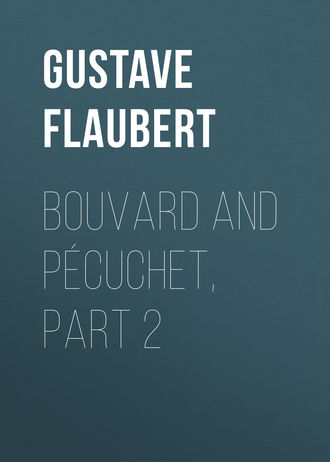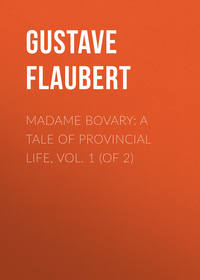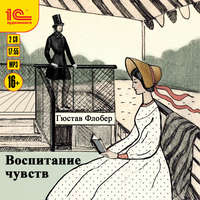 полная версия
полная версияBouvard and Pécuchet, part 2
My own ego overwhelms me for a quarter of an hour. How heavily that rascal weighs upon me at times. He writes too slowly, and does not pose the least in the world when he complains about his work. What a task! And what devil possessed him to induce him to seek such a subject? You ought to give me a recipe for writing faster; yet you complain of having to seek fortune! You!
I have had a little note from Sainte-Beuve, reassuring me as to his health, but rather sad in tone. He seems to be very sorry not to be able to haunt the woods of Cyprus. He is right, after all, or at least, it seems right to him, which amounts to the same thing. Perhaps I shall resemble him when I reach his age, but somehow, I believe not. As I had not the same kind of youth, my old age will probably be different.
This reminds me that I have sometimes dreamed of writing a book on Saint Périne. Champfleury has treated this subject very badly. I see nothing whatever in it of a comical nature; I should bring out its painful and lamentable character. I believe that the heart never grows old; there are people in whom it even grows stronger with age. I was drier and harsher at twenty than I am to-day. I have become softened and feminised by wear and tear, while others have hardened and withered, and that almost makes me indignant. I feel that I am becoming a cow! A mere nothing stirs my emotions; everything troubles and agitates me and shakes me as a reed is shaken in the north wind.
One word of yours, which I have just recollected, made me wish to re-read The Fair Maid of Perth. She was something of a coquette, whatever they say of her. That good fellow had some imagination, decidedly.
Now, adieu. Think of me! I send you my tenderest thoughts.
TO GEORGE SAND
Wednesday night, 1867.Dear Master, dear friend of the good God, “let us talk a little of Dozenval,” let us growl about Monsieur Thiers! Could there ever be a more triumphant imbecile, a more abject fellow, a meaner bourgeois! No, no words could ever give an idea of the nausea that overcomes me when I contemplate that old pumpkin of a diplomat, fattening his stupidity under the muck of the bourgeoisie. Would it be possible to treat with more naïve and more inappropriate unceremoniousness, matters of religion, the people, liberty, the past and the future, national history and natural history, everything? He seems to me as eternal as mediocrity itself! He prostrates me! But the finest thing of all is the spectacle of the brave National Guards, whom he threw out in 1848, now beginning to applaud him! What absolute lunacy! It proves that everything depends upon temperament. Prostitutes – represented in this case by France – are said to have always a weakness for old rascals!
I shall attempt, in the third part of my romance (when I shall have had the reaction following the June days), to insinuate a panegyric about him, à propos of his book: De la Propriété, and I hope that he will be pleased with me!
What care should one take sometimes, in expressing an opinion on things of this world, not to risk being considered an imbecile later? It is a rude problem. It seems to me that the best way is to describe, with the simplest precision, those things that exasperate one. The dissection itself is a vengeance!
Ah, well! it is not at him alone that I am enraged, nor at the others – it is at our people in general.
However, if we had spent our time in instructing the higher classes on the subject of agriculture; if we had thought more of our stomachs than of our heads, probably we should resemble him!
I have just read the preface of Buchez to his Histoire parlementaire. Like other similar publications, it is full of stupidities, of which we feel the weight to this day.
It is not kind to say I do not think of my “old troubadour;” of what else should I think? Of my little book, perhaps, – but that is more difficult and not nearly so agreeable.
How long do you remain at Cannes? After Cannes, does not one usually return to Paris? I shall be there towards the end of January.
In order that my book may be finished in the spring of 1869, from this time on, I shall not allow myself even a week’s holiday. This is the reason why I do not go to Nohant. I am still on the history of the amazons. In order to draw the bow with the best effect, they used to cut off one breast! Was that a good way, after all?
Adieu, dear master; write to me. I embrace thee tenderly!
TO JULES MICHELET
Wednesday, 1868.No, my dear master, I have not received your book, but I have already read it, and am re-reading it. What a mountain is yours! Where will you stop?
I am overwhelmed by this mass of ideas, and amazed at their profundity.
I believe I never have read anything that impressed me more deeply than that part about the baths of Acqui. You bring the Pyrenees and the Alps before our very eyes. But in your company one is always on the heights!
The weighty romance in which you express an interest (weighty for me, while waiting to see what it will be for others!), will not be finished in less than a whole year. I am full of it now, in the history of ’48. My profound conviction is that the clergy has acted amazingly.
The dangers of democratic Catholicism, pointed out by you in the preface to your Revolution, are already here. Ah! we are indeed alone. But you remain to us, you!
I clasp your hand warmly, and beg you to believe me yours, with true affection.
TO GEORGE SAND
Croisset, Wednesday evening, Sept. 9, 1868.Is this handsome conduct, dear master? Two months have passed since you wrote last to your old troubadour! Are you in Paris, Nohant, or where?
They say that Cadio is being rehearsed at the Porte Saint-Martin (are you very sorry, you and Chilly?). They say also, that Thuillier will make her reappearance in your play. (I thought she was dying – I mean Thuillier, not your play.) And when will Cadio be produced. Are you pleased?
I live absolutely like an oyster. My romance is the rock to which I cling, and I know nothing of what is going on in the world. I do not even read, or rather, I read only the Lanterne. Rochefort bores me, to tell the truth. One must, however, have considerable bravery to dare to say, even timidly, that perhaps he is not the first writer of the century! O Velches! Velches! as Monsieur de Voltaire would sigh, or rather, roar!
And Sainte-Beuve – do you see him? I am working furiously. I have just written a description of the forest of Fontainebleau, which has filled me with a desire to hang myself on one of its trees! I was interrupted for three weeks, and had a hard task to put myself in train to work again. I have the peculiarity of a camel – I find it difficult to stop when once I get started, and hard to start after I have been resting. I have worked steadily for a year at a time. After which I loafed definitely, like a bourgeois. It was difficult at first, and not at all pleasant. It is time now that I should do something fine, something that shall please me. That which would please me greatly for a quarter of an hour would be to embrace you! When shall I be able to do so? From now until that time, I send you a thousand sweet thoughts.
TO MAXIME DUCAMP
Croisset, July 23, 1869.My good old Max: I feel the need of writing you a long letter. I do not know whether I shall have strength, but I will try.
Since his return to Rouen, after receiving his nomination for the place of librarian (August, 1867), our poor Bouilhet was convinced that he should leave his bones there. Everyone, including myself, pitied him for his sadness. He did not appear the man he was formerly; he was completely changed, except for his literary intelligence, which remained the same. In short, when I returned to Paris, in June, I found him a lamentable figure. A journey that he made to Paris on account of his Mademoiselle Aïssé, because the manager demanded that certain changes be made in the second act, was so difficult for him that he could scarcely drag himself to the theatre.
On visiting him at his house, the last Sunday in June, I found Dr. P – of Paris, X – of Rouen, Morel, the alienist, and a good chemist, one of Bouilhet’s friends, named Dupré. Bouilhet dared not ask for a consultation with my brother, realising that he was very ill and fearing to hear the truth.
Dr. P – sent him to Vichy, whence Villemain hastened to despatch him back to Rouen. On debarking at Rouen, he finally summoned my brother. The evil was found to be irreparable, as indeed Villemain had written me.
During these last two weeks my mother has been at Verneuil, at the house of the Mesdames V – , and letters have been delayed three days, so you see what anxiety I have had. I went to see Bouilhet both days that he was here, and observed some amelioration in his condition. His appetite was excellent, as well as his courage, and the tumour on his leg had diminished.
His sisters came from Carny in order to speak to him of religious matters, and were so violent that they really scandalised a worthy canon of the cathedral. Our poor Bouilhet was superb – he sent them packing! When I left him for the last time, on Saturday, he had a volume of Lamettrie on his night-table, which recalled to my mind my poor friend Alfred Le Poittevin reading Spinoza. No priest was summoned. His anger against his sisters appeared to sustain him until Saturday, and then I departed for Paris, in the hope that he would live a long time.
On Sunday, at five o’clock, he became delirious, and recited aloud the scenario of a drama of the Middle Ages on the Inquisition. He called for me, in order to show it to me, and was very enthusiastic over it. Then a trembling seized him; he murmured, “Adieu! Adieu!” His head sank under Léonie’s chin, and he died very quietly. Monday morning my porter awakened me with a telegram that announced the death in the usual terse fashion of a despatch. I was alone; I packed my things, sent the news to you, and went to tell it to Duplan, who was engaged in his business affairs. Then I walked the streets an hour, and it was very hot near the railway station. From Paris to Rouen in a coach filled with people. Opposite me was a damsel that smoked cigarettes, stretched her feet out on the seat and sang.
When I saw once more the towers of Mantes I thought I should go mad, and I believe I was not far from it. Seeing me very pale, the damsel offered me her eau de Cologne. It revived me a little, but what a thirst! That of the desert of Sahara was nothing to it. At last I arrived at the Rue de Bihorel; but here I will spare you details.
I never met a better fellow than little Philip; he and that good Léonie took admirable care of Bouilhet. I approved of everything they had done. In order to reassure Bouilhet, and to persuade him that he was not dangerously ill, Léonie had refused to marry him, and her son encouraged her in this resistance. This marriage was so much the fixed intention of Bouilhet, however, that he had had all the necessary papers drawn. As for the young man, I found that he had behaved in every way like a gentleman.
D’Osmoy and I conducted the ceremonies. A great many persons came to the funeral, two thousand at least; the prefect, the procurer-general, etc., – all the little dignitaries! Would you believe that even while following his coffin, I realised keenly the grotesqueness of the ceremony? I fancied I could hear him speaking to me; I felt that he was there, at my side, and it seemed as if he and I were following the corpse of some one else! The weather was very hot, threatening a storm. I was covered with perspiration, and the walk to the cemetery finished me. His friend Caudron had chosen the spot for the grave, near that of Flaubert senior. I leaned against a railing to breathe. The coffin stood on the trestles over the grave. The discourses began (there were three!); then I fainted, and my brother and a stranger took me away.
The next day I went to my mother, at Serquigny. Yesterday I went to Rouen, to take charge of Bouilhet’s papers; to-day I have read the letters that have been sent to me, and oh! dear Max, it was hard!
In his will he left instructions to Léonie that all his books and papers should be given to Philip, charging the latter to consult with four friends in order to decide what to do with the unedited works: myself, D’Osmoy, you, and Caudron. He left a volume of excellent poems, four plays in prose, and Mademoiselle Aïssé. The manager of the Odéon does not like the second act of this play; I do not know what he will do.
It will be necessary for you and D’Osmoy to come here this winter, so that we may decide what shall be published. My head troubles me too much for me to continue now, and besides, what more can I say?
Adieu! I embrace you tenderly. There is only you now, only you! Do you remember when we wrote Solus ad solum?
In all the letters I have received I find this phrase: “We must close up our ranks.” One gentleman, whom I do not know, has sent his card, with these two words: Sunt lacrymæ!
TO EDMOND DE GONCOURT
Sunday evening, 1870.How I pity you, my poor friend! Your letter overcame me this morning. Except for the personal confidence you made me (which you may be sure I shall keep), it told me nothing new, or rather, I mean that I had guessed all that you wrote me. I think of you every day and many times a day. The memory of my lost friends leads me fatally to the thought of you! The schedule has been well filled during the past year – your brother, Bouilhet, Sainte-Beuve, and Duplan! My dreams are darkened by the shadows of tombs, among which I walk.
But I dare not complain to you; for your grief must surpass all those one could feel or imagine.
Do you wish me to speak of myself, my dear Edmond? Well, I am engrossed in a work that gives me much pain, – it is the preface to Bouilhet’s book. I have glided over the biographical part as much as possible. I shall write more at length after an examination of his works, and still more upon his (or our) literary doctrines.
I have re-read all that he ever wrote. I have run through our old letters. I have found a series of souvenirs, some of which are thirty years old. It is not very cheerful work, as you may imagine! And besides, here at Croisset, I am pursued by his phantom, which I find behind every bush in the garden, on the divan in my study, and even among my garments – in my dressing-gown, which sometimes he used to wear.
I hope to think less about him when this sad work is finished, – in about six weeks. After that I shall try to re-write Saint Antony, although my heart is not in it now. You know well that one always writes with the thought of some particular person in view.
The particular person being, for me, no more, my courage fails me.
I live alone here with only my mother, who grows visibly older from day to day. It has become impossible to hold any serious conversation with her, and I have no one to whom I can talk.
I hope to go to Paris in August, and then I shall see you. But where shall you be? Write to me about yourself sometimes, my poor Edmond! No one pities you more than I. I embrace you warmly.
TO GEORGE SAND
Sunday, June 26, 1870.Someone forgets her old troubadour, who has just come from the funeral of a friend. Of the seven friends that used to gather at the Magny dinners, only three remain! I am stuffed with coffins, like an old churchyard! I have had enough of it, frankly!
Yet in the midst of all this, I go on working! I finished last night the preface to my poor Bouilhet’s book. I intend to see whether some means may not be found to produce a comedy of his in prose. After that I shall take up Saint Antony once more.
And you, dear master, what has become of you and yours? My niece is in the Pyrenees, and I live here alone with my mother, who grows more and more deaf, so that my existence is far from lively. I should go to some warmer climate. But to do that I have neither time nor money. So I must erase and re-write, and dig away as hard as possible.
I shall go to Paris early in August. I shall stay here through October, in order to see the performance of Aïssé. My absence will be limited to a week at Dieppe about the end of the month. These are my projects.
The funeral of Jules de Goncourt was very sad. Théo was there and shed floods of tears.
TO MADAME REGNIER
Thursday evening, 7 o’clock, 1871.Dear Madame: I have had to occupy me during the last few weeks
First: the arrangements regarding Bouilhet’s tomb;
Second: plans about his monument;
Third: looking after his volume of poems, which has just gone to press;
Fourth: finding an engraver to make his portrait;
Fifth: all my time for two weeks was taken up with Aïssé, I shall read it to-morrow to the actors. The rehearsals will begin next Saturday, and the play will be produced about the first of January.
I was obliged to leave Croisset so unexpectedly that my servant and my belongings will not arrive until three days later. A detailed account of the intrigues I have had to demolish would fill a volume.
I have engaged the actors. I have worked myself on the costumes at the Cabinet des Estampes; in short, I have not had a moment’s rest for two weeks; and this petty life, so exasperating and so busy, will last at this rate at least two full months.
What a world! I am not surprised that it killed my good Bouilhet! Besides, I have re-written my preface to his books, as it displeased me in its former state.
I beg you, for heaven’s sake, to give me a little liberty for the moment because with the best will in the world, it is impossible for me to do everything at once. I must attend first to the most pressing affairs. Besides, you are wrong to wish to publish now. What good will it do? Where would you find readers?
I do not hide from you the fact that I find rather unjust your amiable reproaches regarding the voyage to Mantes. Why can you not understand that it would be very painful to me to go to Mantes? Every time I pass before the buffet, I turn away my head! Nevertheless, I will keep my promise. But it would be easier for me to go from Paris to Mantes than to stop there in passing. Do not be vexed with me any longer; pity me, rather!
TO GEORGE SAND
Tuesday, April 16, 1872.Dear good master: I ought to have replied at once to your first letter, so sweet and tender. But I was too sad. The physical force to do it failed me.
To-day, at last, I have begun to hear the birds sing and to notice the green leaves. The sunshine no longer irritates me, which is a good sign. If I could only follow my inclination to travel, I should be saved.
Your second letter (that of yesterday) moved me to tears. How good you are! What a kind heart! I have no need of money just at present, thank you. But if I were in need of it, I should certainly ask you for it.
My mother left Croisset to Caroline, on condition that I should retain my apartments there. So until the complete liquidation of the succession, I shall remain here. Before deciding upon the future, I must know what I shall have to live upon; after that, we shall see.
Shall I have the courage to live absolutely alone in a solitary place? I doubt it. I am growing old. Caroline cannot live here now. She has two places already, and the house at Croisset is expensive to keep up.
I believe that I shall give up my lodgings in Paris. Nothing calls me there any more. All my friends are dead, and the last, my poor Théo, is not likely to be here long. I fear it! Ah, it is hard to make oneself over at fifty years!
I have realised during the last two weeks that my poor good mamma was the being I have loved most! To lose her is like tearing away a part of my own body.
TO THE BARONESS LEPIC
At my hermitage,September 14 (the monthcalled Boédromion by theGreeks), 1872.I take up my pen to write to you, and, shutting myself up in the silence of my study, I permit myself, O beautiful lady, to burn at your feet some grains of purest incense!
I say to myself: She has gone to the new Athens with the foster-sons of Mars! Their limbs are covered with brilliant blue, while I wear a rustic coat! Glittering swords dangle at their sides, while I carry only my pens! Plumes ornament their heads, while I have scarcely any hair! Many cares and much study have ravished from me that crown of youth – that forest which the hand of Time, the destroyer, strips from our brows.
This is the reason why my breast is torn by blackest jealousy, O lovely lady!
But your missive, thank the gods! came to me like a refreshing breeze, like a veritable perfume of dittany.
If I could only have the certainty of seeing you, at no distant time, amid our fields, settled near us! The rigour of the approaching blasts of winter would be softened by your presence.
As to the political outlook, your anxieties are, perhaps, greater than they need be. We must hope that our great national historian will close, for a time, the era of revolutions. May we see the doors of the temple of Janus shut forever! That is the desire of my heart, as a friend of the arts and of innocent gaiety.
Ah, if all men, fleeing the pomp of courts and the agitations of the Forum, would listen to the simple voice of nature, there would be only happiness here below, the dances of shepherds, fond embraces beneath the trees on one side and another – here, there, everywhere! But my ideas run away with me.
Will Madame your mother devote herself always to the occupations of Thalia? Very well! She proposes to face the public in the house of Molière. I comprehend that, but I believe it would be better (in the interest of her dramatic lucubration) if I myself should take this fruit of her muse to the director of that establishment. Then, as soon as I should arrive in the capital, I should make my toilet, call my servant and command him to go and find a coach for me in the public square; I should enter the vehicle, drive through the streets, arrive at the Théâtre Française, and finish by finding our man. All this would be for me only the affair of a moment!
In declaring myself, Madame, your unworthy slave, I depose
PRUD’ HOMME.TO EMILE ZOLA
Croisset, near Rouen, June 3, 1874.I have read it —La Conquête de Plassans– read it all at one breath, as one swallows a glass of good wine; then I ruminated over it, and now, my dear friend, I can talk sensibly about it. I feared, after the Ventre de Paris, that you would bury yourself in the “system” in your resolution. But no! You are a good fellow! And your latest book is a fine, swaggering production!
Perhaps it fails in making prominent any special place, or having a central scene (a thing that never happens in real life), and perhaps also there is a little too much dialogue among the accessory characters. There! in picking you to pieces carefully, these are the only defects I discover. But what power of observation! what depth! what a masterly hand!
That which struck me most forcibly in the general tone of the work was the ferocity of passion underlying the surface of good-fellowship. That is very strong, old friend, very strong and broad, and well sustained.
What a perfect bourgeois is Mouret, with his curiosity, his avarice, his resignation, and his flatness! The Abbé Faujas is sinister and great – a true director! How well he manages the woman, how ably he makes himself her master, first in taking her up through charity, and then in brutalising her!
As to her (Marthe), I cannot express to you how much I admire her, and the art displayed in developing her character, or rather her malady. Her hysteric state and her final avowal are marvellous. How well you describe the breaking-up of the household!
I forgot to mention the Tronches, who are adorable ruffians, and the Abbé Bouvelle, who is exquisite with his fears and his sensibility.
Provincial life, the little gardens, the Paloque family, the Rastoil, and the tennis-parties, – perfect, perfect!








